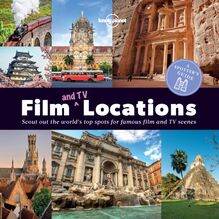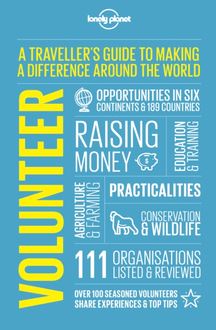Lonely Planet's Best Ever Video Tips , livre ebook
78
pages
English
Ebooks
2015
Vous pourrez modifier la taille du texte de cet ouvrage
Obtenez un accès à la bibliothèque pour le consulter en ligne En savoir plus
Découvre YouScribe et accède à tout notre catalogue !
Découvre YouScribe et accède à tout notre catalogue !
78
pages
English
Ebooks
2015
Vous pourrez modifier la taille du texte de cet ouvrage
Obtenez un accès à la bibliothèque pour le consulter en ligne En savoir plus
Publié par
Date de parution
01 août 2015
EAN13
9781743609569
Langue
English
Poids de l'ouvrage
1 Mo
Publié par
Date de parution
01 août 2015
EAN13
9781743609569
Langue
English
Poids de l'ouvrage
1 Mo
CONTENTS
Introduction
BEFORE YOU GO
What camera?
Life through the lens
Accessorise
Have a plan
Power off the beaten track
Keep equipment safe
Tripods
Back up
Audio
Have a checklist
Practice makes perfect
TECHNICAL TIPS
The rule of thirds
The Holy Trinity of exposure
Depth of field
Don’t cross the line
Know your shots
Tracking and panning
Avoid the zoom
You’ve been framed
Landscapes
Wildlife
Time-lapse sequences
Action
Adverse conditions
Bright sunlight
The dark
Interviews
Wild audio tracks
Talking to camera
Be likeable and authentic
CREATIVE TIPS
Connect with your audience
The power of suggestion
The etiquette of filming
Vlogging in public spaces
Finding stories
The camera gets you access
Cull the cliché
Learn the art of patience
To shoot or not to shoot
EDITING TIPS
Editing software
Finding your tone
Mix up your shots
Honour the pace of your story
Keep it short and snappy
Know your cuts
Cutting on action
Using music
Be organised
SHARING TIPS
Choose your platform
YouTube: the basics
Get the word out
Vine videos
Glossary
About the authors
Acknowledgements
INTRODUCTION
V IDEO IS A POWERFUL VEHICLE for capturing our travel experiences. It’s an assault on the senses: image, movement and sound conspire to deliver to the viewer a vivid essence of place and time. Where photography can – literally – offer only a snapshot of a single moment, video can build a montage of sights, points of view and real-time action. At its best it immerses the audience, making them feel like they’re really there in the moment, hearing the bustle and smelling the aromas for themselves.
There are many factors that contribute to a great travel video, but don’t let that put you off. Thanks to a lifetime’s exposure to TV and movie culture, adverts and social media video, we all possess an innate understanding of what makes good video. The 52 tips that follow offer an insight into the practical skills you need to make original and entertaining video, from technical know-how and compositional advice to creative suggestions and editing tips.
Whether you’re a novice or a veteran videographer, you’ll find tips here to spark ideas and inspire creativity
You can invest in top-of-the-range cameras, lenses and equipment, but you don’t have to. Smartphones can shoot great footage, and editing software is more accessible than ever. The YouTube generation has proven that anyone can connect with an audience; you don’t need qualifications or years of experience. Whether you’re a novice or a veteran videographer, you’ll find tips here to spark ideas and inspire creativity for your next trip and beyond.
CHAPTER
1
BEFORE YOU GO
TIPS BY Teton Gravity Research * Russ Malkin * Lucy Clements * Nick Ray
1
BEFORE YOU GO
WHAT CAMERA?
Let’s start with the basics: what cameras guarantee you good-quality video?
One option is to use a Digital Single-Lens Reflex camera, more commonly known as a DSLR. These can retail for anywhere from US$600 to $5,000, but even those on the cheaper end of this scale can shoot great video. DSLRs can be outfitted with a variety of different lenses, but we recommend a mid-range zoom lens like a 24–105mm zoom, which is the most versatile.
But if you plan to share your videos via social media or online, the truth is that an iPhone 6 Plus with the maximum memory (132GB) can reap fantastic results. Install the iMovie app to allow you to edit the footage there and then; this technology is so sophisticated and intuitive to use that anyone can produce well-crafted shows on their handset, ready to upload directly to any social media platform. Of course, you may prefer to consider the equivalent Android option.
Don’t shoot in portrait
Whichever smartphone option you choose, make sure that you always shoot landscape – that is, hold the phone horizontally – to avoid the wrong aspect ratio in your finished product.
2
BEFORE YOU GO
LIFE THROUGH THE LENS
There is a bewildering choice of lenses for DLSR on the market and most videographers need to be selective, for reasons of budget and portability.
The best all-round lenses are the zoom lenses with a good range, such as 24–105mm (1). Both Canon and Nikon offer these models with an image stabiliser, which really helps when shooting video.
If you’re set on capturing wildlife, it’s wise to invest in a longer lens, but check out the size and weight of the lens in person before ordering online, as some of these lenses will outmuscle the camera itself. Choose a zoom lens with a good range, so you can capture action both far and near. A 100–400mm (2) will do the trick, although it is pricey, so novice shooters might prefer the distinctly cheaper 70–300mm flavour (3). Longer lenses are also favoured by sports photographers, so are good for all-round action shots.
A fish-eye lens or ultra-wide (4) is good for indoor scenes. Favoured by hotels and estate agents hoping to use sleight of eye to lure potential clients, they can make a room appear considerably larger than it is in reality.
Finally, it’s hard to beat the sheer image quality of a fixed focal length lens. For decades this has been the 50mm lens (5), as this offers the closest approximation to the image as seen by our eyes.
3
BEFORE YOU GO
ACCESSORISE
Preparation is everything. Before you leave, think about what you plan to shoot and how location, weather and access to power will affect your production.
If you’re out for the whole day, bring a couple of extra batteries (1). Anything longer than a day and it’s time to start thinking about access to power so you can recharge (2). There are some great choices like Goal Zero for solar and battery packs that can charge on the go. See Click here for more tips on staying charged.
Think about how you will carry your camera and gear. If you’re planning to shoot on rough terrain, an adventure camera pack can be a great investment (3). Make sure you choose one with a hip belt, straps for attaching tripods and back support. Check out Dakine and F-Stop packs for some great options.
Travelling in a wet environment? Look into drybags and dryboxes like Pelican cases for digital cameras (4). For smartphones there’s a huge choice of waterproof cases available: these also serve to protect the phone from dirt and knocks, so it’s worth picking a good one like the Lifeproof Nuud or the Otterbox Preserver.
If you plan to film any action adventures, consider investing in one or two of the latest technology GoPros (5). These are small and lightweight (so easy to carry with you), versatile and boost videos with a high-octane spin.
A list of locations and places or things of interest you’d like to film, along with a written itinerary, can help focus your efforts (6).
4
BEFORE YOU GO
HAVE A PLAN
Take the time to consider the final product before you start shooting it – or even before you leave for your trip.
Are you filming for personal use or to share it with others? Do you want to send the footage back during the trip or store the content while travelling? With a firm understanding of what you’re trying to achieve, you can set yourself up perfectly with the right equipment, the right social media links and any other assistance you might need.
Think too about your practical plan of action. For example, do you want to film your travelling companion(s) or film a piece to camera yourself? Do you want to do a voiceover or just a soundtrack? Try presenting to camera before you go to see how you come across and to make sure that whoever is filming gets the composition right and is technically aware of the equipment you’re using. It is dreadful to come home to discover that they filmed everything portrait instead of landscape or obscured part of the lens with their finger (this happens more frequently than you think!).
The decisions you make at this early stage will dictate how your final video will look, so engage with your own motivations at an early stage and your efforts will pay off.
5
BEFORE YOU GO
POWER OFF THE BEATEN TRACK
In remote areas, power sources may be unreliable, scarce or simply non-existent. So if you’re going off the beaten track, it pays to think ahead.
If you’re using a DSLR, pack plenty of spare batteries and memory cards to carry with you on the road. Take any opportunity to recharge, and never just assume that the power will stay on. If you plan to buy a back-up hard drive, it’s worth choosing one that can be charged directly from a laptop – that way, as long as your laptop has power, your files can be backed up safely.
If your accommodation doesn’t have power, check the local cafés for power sources you can borrow. Failing that, seek out a vendor who charges mobile phones, but be wary of leaving expensive equipment there: it may be too much temptation for someone who earns very little money. Stay with them while recharging, or leave a trusted tour guide with them.
Waste not want not
Be wary of wasting precious battery life on filming for filming’s sake. It’s frustrating to find that you can’t capture that perfect moment simply because you used up so much battery on a mediocre sunset the night before.
6
BEFORE YOU GO
KEEP EQUIPMENT SAFE
Whether it’s a top-of-the-range DSLR or just a smartphone, visible camera equipment can make you a target for thieves. Be savvy and stay aware of those around you.
Check the small print of your travel insurance to ensure it will cover all your equipment for the entire duration of your trip. There are specialised travel gadget insurers: Travel Gadget Insurance, Protect your Bubble, Gadget Guardian and Gadget Cover.
Pack expensive equipment in your hand luggage when travelling by plane or bus, never in the hold.
Stay in self-contained rooms, not dorms. Shared rooms may be cheaper, but in dorms you have no control over who can gain access to your stuff.
Leave expensive items in














